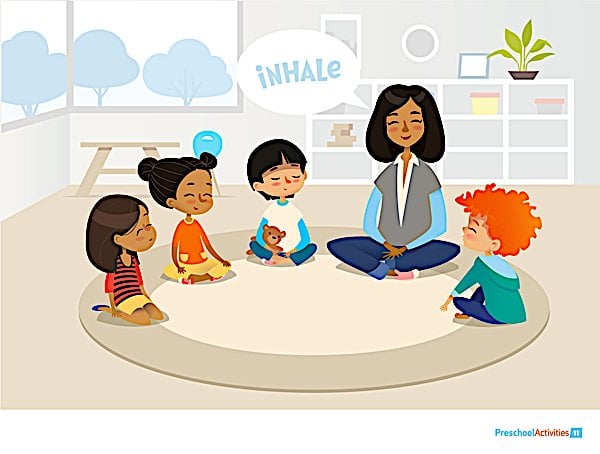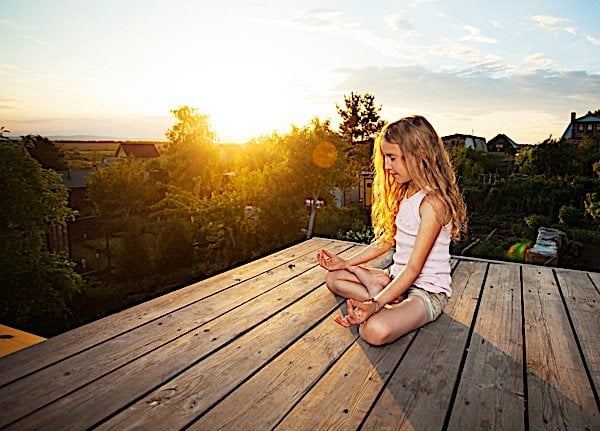Meditation for children: Peer-reviewed studies support structured meditation in classrooms and homes to help children deal with depression, negative coping and self-hostility
Meditation is an essential component of Buddhism that enables us to settle, concentrate, and connect body and mind. Study after study has shown the many benefits it can bring us, including a greater sense of calm, understanding, and empathy. Why leave all its benefits for adulthood?
Meditation should be taught from the earliest of ages, to enable children to deal with stress, anger, and frustration, in a productive manner — both at school and at home. Studies indicate significantly lower levels of depression, negative coping, self-hostility and posttrauma symptons with children who meditate.
Equally, the elderly, especially the very ill or fragile, can benefit from structured meditation in their senior-care facility. The benefits of breathing, posture and contemplation meditation can easily be easily demonstrated and have consistently been indicated in peer-reviewed studies. [See our previous story on the peer-reviewed benefits of meditation>>]
For instance, one school-based mindfulness study, peer reviewed in a Pediatric publication, concluded:
“Three hundred fifth- to eighth-grade students (mean 12.0 years) were in MBSR and HT classes and provided survey data …The groups were comparable at baseline. Postprogram, MBSR students had significantly lower levels of somatization, depression, negative affect, negative coping, rumination, self-hostility, and posttraumatic symptom severity (all Ps < .05) than HT.”

Meditation and Emotional Intelligence
by Guest Contributor Sally Keys
[Previous feature from Sally Keys, Reconnecting with Nature>>]
Many educators are now focusing on emotional intelligence; the idea that being a whole person (knowing how to resolve conflicts, communicate well, manage anger, etc.) is more important than simply being academically ‘smart’.
Meditation is perhaps the most powerful way that children can become more emotionally intelligent. It teaches them, from an early age, to breathe and recollect their thoughts and emotions when they are angry, which evades tantrums and other unproductive responses.
The benefits are straightforward. According to pediatric researchers: “These findings support the hypothesis that mindfulness instruction improves psychological functioning and may ameliorate the negative effects of stress and reduce trauma-associated symptoms among vulnerable urban middle school students.”

Tips for children
To get children in the mood to meditate, it helps to set up an attractive space at home where they feel comfortable and at peace. Fragrance is important when it comes to creating ambience, as is light. Instead of fluorescent or LED lighting, use candles, whose flickering flames and beautiful fragrance are very relaxing for children and adults alike. Make sure to use 100% natural soy candles rather than paraffin, since the latter contains toxins which have been declared a cancer risk by the American Chemical Society. Soy candles smell nice, yet do not produce soot or toxins that harm people and pets in the home.
Meditation as a Powerful Tool Against Anxiety and Stress
Children who suffer from anxiety and the powerful panic attacks that a sustained state of ‘fight or flight’ can bring about, can benefit from meditation, which has been proven scientifically to lower stress hormone levels. Meditation allows us to be control of our body and mind, rather than the other way around; stopping a panic attack in its tracks can be as simple as taking part in pranayamic breathing, even just for a few minutes. [Of course, always see your care professional before acting on any advice.]
Meditation works in a preventive manner too; since it allows us to be more in tune with our biological clock, our emotions and sensations, children who practice it regularly can be aware of subtle clues that they are stressed, hungry, or tired, and they can quickly turn to breathing, affirmations, or silent meditation before they actually begin to feel anxious.
There are so many benefits afforded by meditation, too many to list but including improved cognitive performance and memory, the promotion of self-compassion and kindness towards others, and help with bereavement. The earlier the better, though, since children who see meditation as part and parcel of emotional regulation as well as a way to connect with their inner world, will be stronger, emotionally smarter adults who are more ready to brave life’s many vicissitudes.
More articles by this author

Meditation for children: Peer-reviewed studies support structured meditation in classrooms and homes to help children deal with depression, negative coping and self-hostility

Mind-space, it’s all we need. Meditation quiets the mind, even if you can’t find a quiet space. Buddha’s advice “I am silent.”
Search
Latest Features
Please support the "Spread the Dharma" mission as one of our heroic Dharma Supporting Members, or with a one-time donation.
Please Help Support the “Spread the Dharma” Mission!

Be a part of the noble mission as a supporting member or a patron, or a volunteer contributor of content.
The power of Dharma to help sentient beings, in part, lies in ensuring access to Buddha’s precious Dharma — the mission of Buddha Weekly. We can’t do it without you!
A non-profit association since 2007, Buddha Weekly published many feature articles, videos, and, podcasts. Please consider supporting the mission to preserve and “Spread the Dharma." Your support as either a patron or a supporting member helps defray the high costs of producing quality Dharma content. Thank you! Learn more here, or become one of our super karma heroes on Patreon.
Sally Keys
Author | Buddha Weekly
















